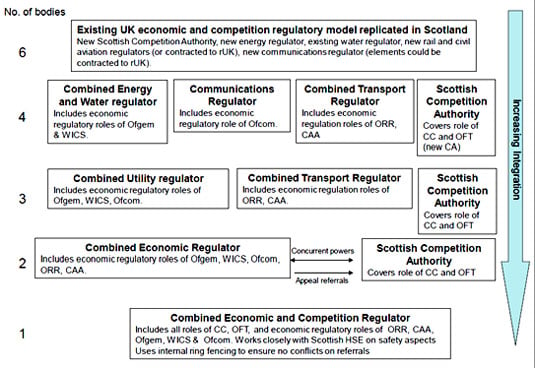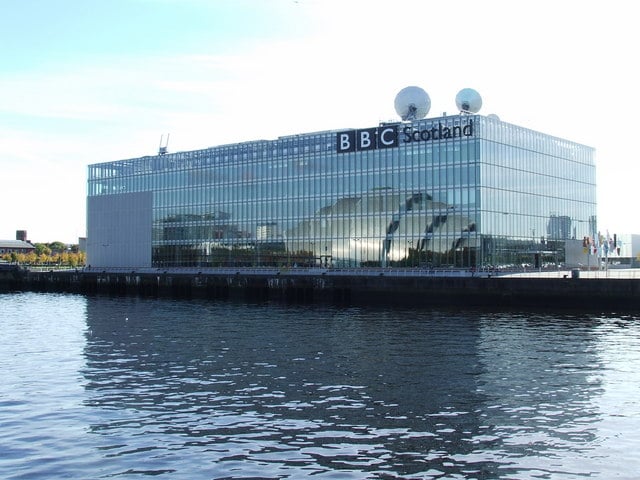Original URL: https://www.theregister.com/2014/07/29/feature_spectral_approach_to_scottish_independence/
Scotland's BIG question: Will independence cost me my broadband?
They can take our lives, but they'll never take our SPECTRUM
Posted in Networks, 29th July 2014 09:01 GMT
Feature On 18 September, the people living in Scotland will vote in a referendum to decide if we should to slice the top off Great Britain and create a separate country. If that happens, and once the locals sober up, Scotland could be a country with universal broadband, a publicly owned postal service and mobile coverage which would be the envy of the world, assuming it can create a regulator capable of doing all that.
An independent Scotland will need all manner of regulators – replicating the environment handed down from Westminster – but of particular interest to Register readers (and your correspondent) is Ofcom – the Office of Communications – and Scottish plans to completely rethink how communications is managed north of the border.
Regular readers will know of my reliance on a microwave connection for anything approaching broadband speeds, but that link is only possible thanks to a licence issued by the (Westminster-based) Office of Communication – prompting my interest on how things will develop, should Scotland cast itself adrift.
It's not just microwave links which will be thrown into confusion by detaching the northern UK. The Scottish Government wants to force the mobile operators into improving rural coverage, and plans to spend £75m building a new digital-TV multiplex full of Scottish content. Not to mention buying the post office back into national ownership, and (perhaps) adding broadband to BT's Universal Service Agreement, so everyone in the newly formed country will be able to get broadband.
We don't know exactly what will happen, of course, because we don't know who would run an independent Scotland. The vote on 18 September is a simple decision on separation, once that has been approved then the all-too-fissiparous "Yes" coalition will quickly disintegrate into factions which have no commonality beyond the desire for independence.
The political landscape beyond that point is open to rigorous debate. Alex Salmond and his Nationalists will probably do OK, given their ability to claim a victory. However, it would be foolish to discount Labour, and even the Lib Dems, who've both traditionally enjoyed Scottish support. So the exact makeup of a national government in Edinburgh is entirely unpredictable.
Still, we do know what the incumbent has in mind, as the devolved parliament has published various documents outlining how it sees an independent Scotland operating. None of those are backed by legislation, but they do represent the intentions of the Edinburgh political elite, and the existing Scottish parliament, so can be taken as fair indication of what will happen.
A new Ofcom for a new Scotland?
Ofcom, the UK's Office of Communication, isn't just about selling off radio spectrum. The body was formed from five regulators – The Office of Telecommunications, Broadcasting Standards Commission, Independent Television Commission, The Radio Communications Agency and The Radio Authority – and, as a result, the regulator has a surprisingly broad remit.
Ofcom licenses radio bands, but also keeps track of unlicensed bands and investigates illegitimate use, when it's not checking for nipple-slips on pre-watershed TV broadcasts, or counting how many letters were delivered on time, or how many copies of Game of Thrones have been torrented. The regulator also tries to make sure "Broadband" is really broad, and keeps on top of the latest technical developments in communications.
The Scottish version will have to do all that too, but Scotland is planning to save costs by amalgamating even more responsibilities into a single regulator. An independent Scotland will be a much smaller country than the UK and is taking its lead from Sweden in regulatory structure. The document Economic and Competition Regulation in an Independent Scotland [PDF] – published by the devolved parliament in Edinburgh – identifies six UK regulatory bodies. It lays out a number of options for creating a mirrored infrastructure, or combining them into a single super-regulator, along with various compromise options in between.

Scottish Regulatory bodies
Combining regulators will, the Scots hope, save money. The same document points to National Audit Office figures which calculate that Ofcom has been 10-13 per cent cheaper to run than the five bodies it replaced, though it admits that much of the saving came from efficiencies unrelated to the merger.
How Scottish can the airwaves be?
Similar levels of saving are expected to arise from further consolidation, based on comparison of per-head costs in other countries. The new regulator should, in theory, save something in the region of £10m annually, but that's based on head-count comparisons with other countries, and "may not be reflective of the costs of delivering economic regulation within a Scottish context".
If Scotland decided to maintain six separate regulators, then it could outsource regulation of telecommunications to the existing offices in London. Ofcom seems keen to take on the work, and it would provide consistency, but in reality it's hard to imagine a newly elected Scottish government handing power back to a quango full of mandarins living in a foreign capital.
However it's organised, a Scottish Ofcom will have to take responsibility for everything Ofcom does at the moment – from policing television nudity to licensing 4G telephones.
Actually, it won't do that last bit, as the spectrum licences owned by the network operators are considered private property. A Scottish government can no more grab the spectrum back than it can lay claim to the land on which my house sits. In the case of war perhaps, or civil emergency, but barring such incidents, the already-allocated spectrum is untouchable.
This is somewhat inconvenient for the Scottish parliament, who would very much like to force operators into extending coverage to every bothy and bolt hole in the Highlands, as Connecting Rural Scotland [PDF] explains:
In an independent Scotland we would have the power to issue future spectrum licences and could include coverage obligations that ensure maximum availability of mobile telecoms throughout Scotland as a whole, including our rural areas.
But when it comes to the existing licences, only O2 took on any coverage obligation, and that's for 95 per cent (indoor) coverage. It was going to be a national obligation, but the Scottish parliament convinced Ofcom to break it down so O2 has to provide 95 per cent coverage in Scotland, England and Wales respectively.
In fact Vodafone has committed to a similar level of coverage, and O2 will get there ahead of schedule, but an independent Scotland will push even harder:
"We will explore the feasibility of setting higher obligations – such as at local authority level" explains Scotland's Future [PDF], the primary policy document of the incumbent parliament.
Quite how they'll push isn't clear. The network operators won't comment publicly on the matter, other than to point out that their licences are pretty clear and that they're already committed to rolling out services across most of Scotland.
A roamin' we will go?
The operators are similarly taciturn on the subject of roaming, in public at least, saying they can't comment on whether customers travelling between the two countries will be subject to gouging rates for making calls, but in private they are saying such charges are extremely unlikely.
Scotland's Future is quite adamant that such a thing can't be allowed:
"There is no reason, in a competitive integrated market, for companies to frustrate customers on both sides of the border by introducing roaming charges after independence."
...And it seems that the operators agree - while they won't state it in public, there will be no roaming rates for English who chose to roam north of the border, or vice versa.
Television, on the other hand, will be different. Not content with spending more than £15m a year on BBC Alba (Freeview channel 8, in case you missed it), the Scottish Parliament has already campaigned for a whole multiplex to play with, and in 2011 priced that at £75m a year. That money was intended to come from the BBC licence fee, though if that proved impossible, then the taxpayer will cover the cost as advertising would, apparently, harm other media in Scotland.

BBC Scotland building, Pacific Quay, Glasgow. Photo by Thomas Nugent, licensed under CC BY-SA 2.0
Scottish TV for Scottish people
A digital multiplex can carry a dozen channels, or half a dozen high-definition streams, but now the SDN has morphed into the Scottish Broadcasting Service with even greater aspirations made possible by independence:
“A Scottish Broadcasting Service founded on the staff and assets of BBC Scotland [will] include an additional English language radio and television station for Scotland – more than meeting the Scottish Broadcasting Commission’s recommendation for a Scottish Digital Network" a government spokesman told us, explaining that "the UK Government would not agree to the Commission’s proposals for a Scottish Digital Network. Only with the full powers of independence can the Scottish Government pursue its vision for a thriving broadcasting sector.”
The website goes into more detail: "The existing BBC charter expires on 31 December 2016 ... the SBS will begin broadcasting on TV, radio and online on 1 January 2017", but that's not all: "The SBS would also inherit a proportionate share of the BBC’s commercial ventures, including BBC Worldwide Ltd, and their associated ongoing profits."
And it might need the money. What Scotland won't have is any more bonanzas in sellable radio spectrum. The really valuable bands have all gone, and Ofcom (whose remit, lest we forget, is efficient use of radio spectrum) has been looking decidedly socialist lately. The regulator has had something of an epiphany, accepting that selling to the highest bidder isn't always the best way, and has been busy promoting unlicensed, and light-licensed, bands.
The next band coming up in the UK is White Space – TV bands which aren't being used locally, so can be exploited with the use of an online database. America already permits such use licence-free, and the UK should join them by the end of 2014. So Scotland could be part of that movement unless a vote for independence slows the whole process, and assuming the SDN doesn’t fill the White Spaces with courses in Gaelic.
When it comes to the rest of Ofcom's role we really don't know what a Scottish version will do. Scotland is the most Christian part of the UK: the last census saw half the population declaring themselves to worship Christ in one form of another, so will the prudish nature of popular religion change what we see in our TVs?
Ofcom measures broadband speeds, and insists that ISPs advertise by average. Do that in Scotland and the speeds will nosedive as the rural lack of unbundling, and distant exchanges, drag down the Edinburgh numbers.
Ofcom regulates the privately owned postal service, but once that's been bought back into public ownership such a regulator might not be necessary.
Ofcom also licenses tens of thousands of microwave links, like my own which continues to provide internet connectivity via the ever-tolerant Claire and her proximity to the local exchange. My licence runs out at the end of September, and I'll need to renew one last time before Edinburgh takes over.
Beyond then, I've no idea what I'll be asked to pay, or to whom I'll be paying it, or whether the Universal Service Obligation will finally see BT digging up my aluminium line and replacing it with copper, or perhaps even glass. Promise me that and I'll be donning the tartan and strapping on my sgian-dubh before you can say "better together". ®